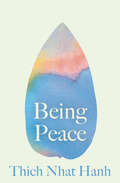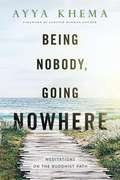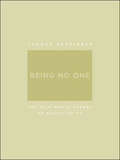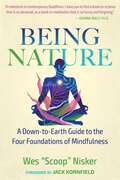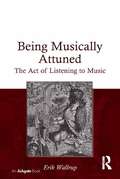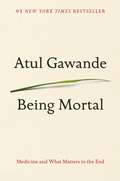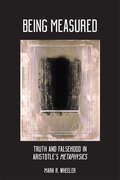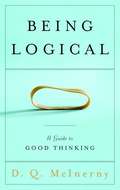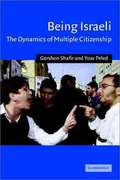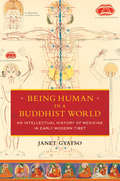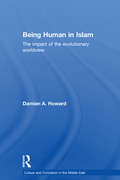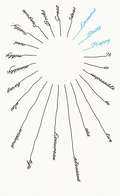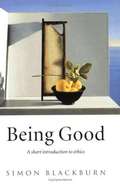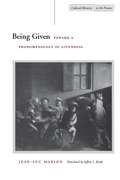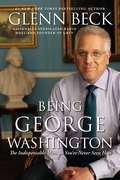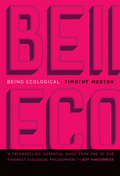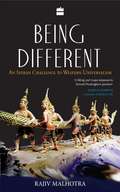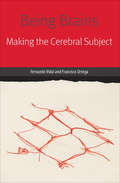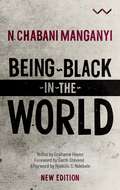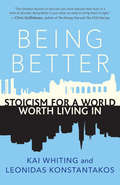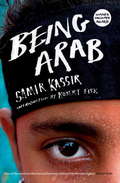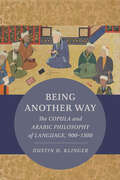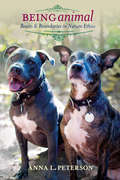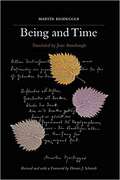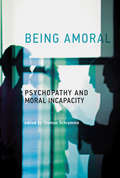- Table View
- List View
Being Peace
by Thich Nhat HanhTHE BELOVED SPIRITUAL CLASSIC: A timeless introduction to Thich Nhat Hanh&’s most important teachings, revealing the connection between peace in oneself and peace in the world.Now updated with a foreword from Dr. Jane Goodall!One of Thich Nhat Hanh&’s first books published in the United States, Being Peace was intended for peace activists and as a commentary on the peace movement of the time. Now translated into more than 30 languages and with half a million copies sold, it has since become an indispensable guide for anyone concerned about the state of the world and the quality of our lives. Thay&’s message of &“being peace in order to make more peace&” is more relevant than ever. Being Peace contains Thich Nhat Hanh&’s key practices and is filled with practical suggestions for how to create a more peaceful world &“right in the moment we are alive.&” Many of the hallmarks of Thich Nhat Hanh appear here for the first time, in his trademark clear and steady style. Now featuring a foreword from Dr. Jane Goodall, this beautiful, newly revised edition is the perfect starting point for those who are getting their first introduction to Buddhism as well as a must-have for those already engaged in the tradition.
Being Nobody, Going Nowhere
by Ayya Khema Zoketsu Norman FischerIn this lucid classic, beloved teacher Ayya Khema introduces the reader to the essence of the Buddhist path. She addresses the how and why of meditation, providing a clear framework for understanding the nature of karma and rebirth and the entirety of the eightfold path. With specific, practical advice Ayya Khema illuminates the practices of compassion and sympathetic joy and offers forthright guidance in working with the hindrances that we all encounter in meditation. Few introductory books are both simple and profound. Being Nobody, Going Nowhere is both.
Being No One: The Self-Model Theory of Subjectivity
by Thomas MetzingerAccording to Thomas Metzinger, no such things as selves exist in the world: nobody ever had or was a self. All that exists are phenomenal selves, as they appear in conscious experience. The phenomenal self, however, is not a thing but an ongoing process; it is the content of a "transparent self-model." In Being No One, Metzinger, a German philosopher, draws strongly on neuroscientific research to present a representationalist and functional analysis of what a consciously experienced first-person perspective actually is. Building a bridge between the humanities and the empirical sciences of the mind, he develops new conceptual toolkits and metaphors; uses case studies of unusual states of mind such as agnosia, neglect, blindsight, and hallucinations; and offers new sets of multilevel constraints for the concept of consciousness. Metzinger's central question is: How exactly does strong, consciously experienced subjectivity emerge out of objective events in the natural world? His epistemic goal is to determine whether conscious experience, in particular the experience of being someone that results from the emergence of a phenomenal self, can be analyzed on subpersonal levels of description. He also asks if and how our Cartesian intuitions that subjective experiences as such can never be reductively explained are themselves ultimately rooted in the deeper representational structure of our conscious minds.
Being Nature: A Down-to-Earth Guide to the Four Foundations of Mindfulness
by Wes Nisker• Provides a practical program, complete with enjoyable, even playful meditations, for realizing greater self-awareness, increased wisdom, and happiness• Shows how recent discoveries in physics, evolutionary biology, and psychology express in scientific terms the same insights the Buddha discovered more than 2,500 years ago• Reveals the origins of attachments, desires, emotions, and thoughts in our own bodiesTaking us on an evolutionary journey to find the origins of emotions, desires, and thoughts in our own bodies, Wes &“Scoop&” Nisker shows not only how cutting-edge science is proving the tenets of the Buddha but also how we can interpret the traditional practices of Buddhism through this scientific lens for more personal freedom and peace of mind. Using the traditional Buddhist meditation series of the Four Foundations of Mindfulness as a framework, Nisker offers a witty narrative along with practical meditations and exercises to train the mind to overcome painful conditioning and gain greater self-awareness, increased wisdom, and happiness. He shows how recent discoveries in physics, evolutionary biology, and psychology express in scientific terms the same insights the Buddha discovered more than 2,500 years ago, such as the impermanence of the body, where thoughts come from, and how the body communicates within itself. Presenting a variety of new ways to harness the power of mindfulness to transform our understanding of both ourselves and the world, Nisker teaches us how to put our understanding of evolution in the service of spiritual awakening.
Being Musically Attuned: The Act of Listening to Music
by Erik WallrupListening according to mood is likely to be what most people do when they listen to music. We want to take part in, or even be part of, the emerging world of the musical work. Using the sources of musical history and philosophy, Erik Wallrup explores this extremely vague and elusive phenomenon, which is held to be fundamental to musical hearing. Wallrup unfolds the untold musical history of the German word for ’mood’, Stimmung, which in the 19th century was abundant in the musical aesthetics of the German-Austrian sphere. Martin Heidegger’s much-discussed philosophy of Stimmung is introduced into the field of music, allowing Wallrup to realise fully the potential of the concept. Mood in music, or, to be more precise, musical attunement, should not be seen as a peculiar kind of emotionality, but that which constitutes fundamentally the relationship between listener and music. Exploring mood, or attunement, is indispensable for a thorough understanding of the act of listening to music.
Being Mortal: Medicine and What Matters in the End
by Atul GawandeIn Being Mortal, bestselling author Atul Gawande tackles the hardest challenge of his profession: how medicine can not only improve life but also the process of its ending<P> Medicine has triumphed in modern times, transforming birth, injury, and infectious disease from harrowing to manageable. But in the inevitable condition of aging and death, the goals of medicine seem too frequently to run counter to the interest of the human spirit. Nursing homes, preoccupied with safety, pin patients into railed beds and wheelchairs. Hospitals isolate the dying, checking for vital signs long after the goals of cure have become moot. Doctors, committed to extending life, continue to carry out devastating procedures that in the end extend suffering.<P> Gawande, a practicing surgeon, addresses his profession’s ultimate limitation, arguing that quality of life is the desired goal for patients and families. Gawande offers examples of freer, more socially fulfilling models for assisting the infirm and dependent elderly, and he explores the varieties of hospice care to demonstrate that a person's last weeks or months may be rich and dignified.<P> Full of eye-opening research and riveting storytelling, Being Mortal asserts that medicine can comfort and enhance our experience even to the end, providing not only a good life but also a good end. <P><b>A New York Times Bestseller</b>
Being Measured: Truth and Falsehood in Aristotle's Metaphysics (SUNY series in Ancient Greek Philosophy)
by Mark R. WheelerOn the basis of careful textual exegesis and philosophical analysis of Aristotle's Metaphysics, Mark R. Wheeler offers a groundbreaking interpretation of Aristotle's theory of truth in terms of measurement. Wheeler demonstrates that Aristotle's investigation of truth and falsehood in the Metaphysics is rigorously methodical, that Aristotle's conceptions of truth contribute to the main lines of thought in the treatise, and that the Metaphysics, taken as a whole, contributes fundamentally to Aristotle's theory of truth. Wheeler provides not only an excellent introduction to the main problems in the theory of truth but also provides contemporary truth theorists with a rigorous explanation of Aristotle's theory of truth.
Being Logical
by D. Q. McInernyWhether regarded as a science, an art, or a skill–and it can properly be regarded as all three–logic is the basis of our ability to think, analyze, argue, and communicate. Indeed, logic goes to the very core of what we mean by human intelligence. In this concise, crisply readable book, distinguished professor D. Q. McInerny offers an indispensable guide to using logic to advantage in everyday life. Written explicitly for the layperson, McInerny’sBeing Logicalpromises to take its place beside Strunk and White’sThe Elements of Styleas a classic of lucid, invaluable advice. As McInerny notes, logic is a deep, wide, and wonderfully varied field, with a bearing on every aspect of our intellectual life. A mastery of logic begins with an understanding of right reasoning–and encompasses a grasp of the close kinship between logical thought and logical expression, a knowledge of the basic terms of argument, and a familiarity with the pitfalls of illogical thinking. Accordingly, McInerny structures his book in a series of brief, penetrating chapters that build on one another to form a unified and coherent introduction to clear and effective reasoning. At the heart of the book is a brilliant consideration of argument–how an argument is founded and elaborated, how it differs from other forms of intellectual discourse, and how it critically embodies the elements of logic. McInerny teases out the subtleties and complexities of premises and conclusions, differentiates statements of fact from statements of value, and discusses the principles and uses of every major type of argument, from the syllogistic to the conditional. In addition, he provides an incisive look at illogical thinking and explains how to recognize and avoid the most common errors of logic. Elegant, pithy, and precise,Being Logicalbreaks logic down to its essentials through clear analysis, accessible examples, and focused insights. Whether you are a student or a teacher, a professional sharpening your career skills or an amateur devoted to the fine points of thought and expression, you are sure to find this brief guide to effecting reasoning both fascinating and illuminating.
Being Israeli: The Dynamics of Multiple Citizenship
by Gershon Shafir Yoav PeledThis penetrating and timely study by two well-known scholars offers a theoretically informed account of the political sociology of Israel. The argument is set in its historical context as the authors trace Israel's development from the beginning of Zionist settlement in Palestine in the early 1880s to the Oslo accords in 1993, and finally to the recent Palestinian uprising. Against this background, they speculate on the idea of citizenship and what it means to be the citizen of a fragmented and ideologically divided society.
Being Human in a Buddhist World: An Intellectual History of Medicine in Early Modern Tibet
by Janet GyatsoCritically exploring medical thought in a cultural milieu with no discernible influence from the European Enlightenment, Being Human in a Buddhist World reveals an otherwise unnoticed intersection of early modern sensibilities and religious values in traditional Tibetan medicine. It further studies the adaptation of Buddhist concepts and values to medical concerns and suggests important dimensions of Buddhism's role in the development of Asian and global civilization.Through its unique focus and sophisticated reading of source materials, Being Human adds a crucial chapter in the larger historiography of science and religion. The book opens with the bold achievements in Tibetan medical illustration, commentary, and institution building during the period of the Fifth Dalai Lama and his regent, Desi Sangye Gyatso, then looks back to the work of earlier thinkers, tracing a strategically astute dialectic between scriptural and empirical authority on questions of history and the nature of human anatomy. It follows key differences between medicine and Buddhism in attitudes toward gender and sex and the moral character of the physician, who had to serve both the patient's and the practitioner's well-being. Being Human in a Buddhist World ultimately finds that Tibetan medical scholars absorbed ethical and epistemological categories from Buddhism yet shied away from ideal systems and absolutes, instead embracing the imperfectability of the human condition.
Being Human in Islam: The Impact of the Evolutionary Worldview (Culture and Civilization in the Middle East)
by Damian HowardIslamic anthropology is relatively seldom treated as a particular concern even though much of the contemporary debate on the modernisation of Islam, its acceptance of human rights and democracy, makes implicit assumptions about the way Muslims conceive of the human being. This book explores how the spread of evolutionary theory has affected the beliefs of contemporary Muslims regarding human identity, capacity and destiny. In his systematic treatment of the impact of evolutionary ideas on modern Islam, Damian Howard surveys several branches of Muslim thought. Muslim responses to the crisis of the religious imagination presented by the evolutionary worldview fall into four different forms, incorporating traditional and modern notions. The book evaluates the content, influence and success of these four forms, asking how Muslims might now proceed to address the profound challenges which evolutionary theory poses to the effective reconstruction of their religious thought. Drawing fascinating parallels with developments in the world of Christian theology which will help understanding between people of the two religions, the author reflects on the question of how Muslims can come to terms with the modern world. A valuable addition to the literature on contemporary Islamic thought, this book will also interest students and scholars of religion and modernity, the history and philosophy of science, and evolutionary theory.
Being Happy (Penguin Great Ideas)
by Epicurus'It is impossible to live the pleasant life without also living sensibly, nobly and justly'The ancient Greek philosopher and teacher Epicurus argued that pleasure - not sensual hedonism, but the absence of pain or fear - is the highest goal of life. His hugely influential lessons on happiness are a call to appreciate the joy of being alive.One of twenty new books in the bestselling Penguin Great Ideas series. This new selection showcases a diverse list of thinkers who have helped shape our world today, from anarchists to stoics, feminists to prophets, satirists to Zen Buddhists.
Being Good: A Short Introduction to Ethics
by Simon BlackburnThis accessible introduction to ethics continues the trend of Blackburn's best-selling Think. His rare combination of depth, rigor and sparking prose, and his distinguished ranking among contemporary philosophers, mark Being Good as an important statement on our current disenchantment with ethics.
Being Given: Toward a Phenomenology of Givenness
by Jean-Luc Marion Jeffrey KoskyAlong with Husserl's Ideas and Heidegger's Being and Time, Being Given is one of the classic works of phenomenology in the twentieth century. Through readings of Kant, Husserl, Heidegger, Derrida, and twentieth-century French phenomenology (e.g., Merleau-Ponty, Levinas, and Henry), it ventures a bold and decisive reappraisal of phenomenology and its possibilities. Its author's most original work to date, the book pushes phenomenology to its limits in an attempt to redefine and recover the phenomenological ideal, which the author argues has never been realized in any of the historical phenomenologies. Against Husserl's reduction to consciousness and Heidegger's reduction to Dasein, the author proposes a third reduction to givenness, wherein phenomena appear unconditionally and show themselves from themselves at their own initiative. Being Given is the clearest, most systematic response to questions that have occupied its author for the better part of two decades. The book articulates a powerful set of concepts that should provoke new research in philosophy, religion, and art, as well as at the intersection of these disciplines. Some of the significant issues it treats include the phenomenological definition of the phenomenon, the redefinition of the gift in terms not of economy but of givenness, the nature of saturated phenomena, and the question "Who comes after the subject?" Throughout his consideration of these issues, the author carefully notes their significance for the increasingly popular fields of religious studies and philosophy of religion. Being Given is therefore indispensable reading for anyone interested in the question of the relation between the phenomenological and the theological in Marion and emergent French phenomenology.
Being George Washington
by Glenn BeckIF YOU THINK YOU KNOW GEORGE WASHINGTON, THINK AGAIN.This is the amazing true story of a real-life superhero who wore no cape and possessed no special powers--yet changed the world forever. It's a story about a man whose life reads as if it were torn from the pages of an action novel: Bullet holes through his clothing. Horses shot out from under him. Unimaginable hardship. Disease. Heroism. Spies and double-agents. And, of course, the unmistakable hand of Divine Providence that guided it all.Being George Washington is a whole new way to look at history. You won't simply read about the awful winter spent at Valley Forge--you'll live it right alongside Washington. You'll be on the boat with him crossing the Delaware, in the trenches with him at Yorktown, and standing next to him at the Constitutional Convention as a new republic is finally born.Through these stories you'll not only learn our real history (and how it applies to today), you'll also see how the media and others have distorted our view of it. It's ironic that the best-known fact about George Washington--that he chopped down a cherry tree--is a complete lie. It's even more ironic when you consider that a lie was thought necessary to prove he could not tell one.For all of his heroism and triumphs, Washington's single greatest accomplishment was the man he created in the process: courageous and principled, fair and just, respectful to all. But he was also something else: flawed.It's those flaws that should give us hope for today. After all, if Washington had been perfect, then there would be no way to build another one. That's why this book is not just about being George Washington in 1776, it's about the struggle to be him every single day of our lives. Understanding the way he turned himself from an uneducated farmer into the Indispensable (yet imperfect) Man, is the only way to build a new generation of George Washingtons that can take on the extraordinary challenges that America is once again facing.
Being Ecological (The\mit Press Ser.)
by Timothy MortonA book about ecology without information dumping, guilt inducing, or preaching to the choir.Don't care about ecology? You think you don't, but you might all the same. Don't read ecology books? This book is for you. Ecology books can be confusing information dumps that are out of date by the time they hit you. Slapping you upside the head to make you feel bad. Grabbing you by the lapels while yelling disturbing facts. Handwringing in agony about “What are we going to do?” This book has none of that. Being Ecological doesn't preach to the eco-choir. It's for you—even, Timothy Morton explains, if you're not in the choir, even if you have no idea what choirs are. You might already be ecological.After establishing the approach of the book (no facts allowed!), Morton draws on Kant and Heidegger to help us understand living in an age of mass extinction caused by global warming. He considers the object of ecological awareness and ecological thinking: the biosphere and its interconnections. He discusses what sorts of actions count as ecological—starting a revolution? going to the garden center to smell the plants? And finally, in “Not a Grand Tour of Ecological Thought,” he explores a variety of current styles of being ecological—a range of overlapping orientations rather than preformatted self-labeling. Caught up in the us-versus-them (or you-versus-everything else) urgency of ecological crisis, Morton suggests, it's easy to forget that you are a symbiotic being entangled with other symbiotic beings. Isn't that being ecological?
Being Different: An Indian Challenge to Western Universalism
by Rajiv MalhotraIn this book the author highlights that while unique historical revelations are the basis for Western religions, dharma emphasizes self-realization in the body here and now.
Being Brains: Making the Cerebral Subject (Forms Of Living Ser.)
by Fernando Vidal Francisco OrtegaThis &“interesting, informative, and provocative book&” explores the pervasive influence of neuroscience and &“the view that we are essentially our brains&” (History and Philosophy of the Life Sciences). Being Brains offers a critical exploration of neurocentrism, the belief that &“we are our brains,&” which came to prominence in the 1990s. Encouraged by advances in neuroimaging, the humanities and social sciences have gravitated toward the brain as well, developing neuro-subspecialties in fields such as anthropology, aesthetics, education, history, law, sociology, and theology. Even in the business world, dubious enterprises such as &“neuromarketing&” and &“neurobics&” have emerged to take advantage of the heightened sensitivity to all things neuro. While neither hegemonic nor monolithic, the neurocentric view embodies a powerful ideology that is at the heart of some of today&’s most important philosophical, ethical, scientific, and political debates. Being Brains examines the internal logic of this new ideology, as well as its genealogy and its main contemporary incarnations. Being Brains was chosen as the 2018 Outstanding Book in the History of the Neurosciences by the International Society for the History of the Neurosciences.
Being Black in the World
by N. Chabani ManganyiAn annotated edition of a classic text by South Africa's first black psychologist, a collection of essays reflecting on what it meant to be black during the apartheid yearsBeing-Black-in-the-World, one of N. Chabani Manganyi’s first publications, was written in 1973 at a time of global socio-political change and renewed resistance to the brutality of apartheid rule and the emergence of Black Consciousness in the mid-1960s. Manganyi is one of South Africa’s most eminent intellectuals and an astute social and political observer. He has written widely on subjects relating to ethno-psychiatry, autobiography, black artists and race. In 2018 Manganyi’s memoir, Apartheid and the Making of a Black Psychologist was awarded the prestigious ASSAf (The Academy of Science of South Africa) Humanities Book Award. Publication of Being-Black-in-the-World was delayed until the young Manganyi had left the country to study at Yale University. His publishers feared that the apartheid censorship board and security forces would prohibit him from leaving the country, and perhaps even incarcerate him, for being a ‘radical revolutionary’. The book found a limited public circulation in South Africa due to this censorship and original copies were hard to come by.This new edition is an invitation to a younger generation of citizens to engage with early decolonialising thought by an eminent South African intellectual. While the essays in this book are clearly situated in the material and social conditions of that time, they also have a timelessness that speaks to our contemporary concerns regarding black subjectivity, affectivity and corporeality, the persistence of a racial (and racist) order and the possibilities of a renewed de-colonial project. Each of these short essays can be read as self-contained reflections on what it meant to be black during the apartheid years. Manganyi is a master of understatement, and yet this does not stop him from making incisive political criticisms of black subjugation under apartheid. The essays will reward close study for anyone trying to make sense of black subjectivity and the persistence of white insensitivity to black suffering. Ahead of its time, the ideas in this book are an exemplary demonstration of what a thoroughgoing and rigorous de-colonial critique should entail. The re-publication of this classic text is enriched by the inclusion of a foreword and annotation by respected scholars Garth Stevens and Grahame Hayes respectively, and an afterword by public intellectual Njabulo S. Ndebele.
Being Better: Stoicism for a World Worth Living In
by Kai Whiting Leonidas KonstantakosPractical answers to the urgent moral questions of our time from the ancient philosophy of Stoicism Twenty-three centuries ago, in a marketplace in Athens, Zeno of Citium, the founder of Stoicism, built his philosophy on powerful ideas that still resonate today: all human beings can become citizens of the world, regardless of their nationality, gender, or social class; happiness comes from living in harmony with nature; and, most important, humans always have the freedom to choose their attitude, even when they cannot control external circumstances. In our age of political polarization and environmental destruction, Stoicism&’s empowering message has taken on new relevance. In Being Better, Kai Whiting and Leonidas Konstantakos apply Stoic principles to contemporary issues such as social justice, climate breakdown, and the excesses of global capitalism. They show that Stoicism is not an ivory-tower philosophy or a collection of Silicon Valley life hacks but a vital way of life that helps us live simply, improve our communities, and find peace in a turbulent world.
Being Arab
by Robert Fisk Samir Kassir Will HobsonIn the years before his assassination in 2005, Samir Kassir became one of Lebanon's foremost public intellectuals, a fearless critic of tyranny and an inspiring advocate of democracy. In Being Arab, his last book, he calls on the peoples of the Middle East to reject both Western double standards and Islamism in order to take the future of the region into their own hands. With the Arab Spring, millions have now answered that call.
Being Another Way: The Copula and Arabic Philosophy of Language, 900–1500 (Berkeley Series in Postclassical Islamic Scholarship #6)
by Dustin KlingerIn Being Another Way, Dustin Klinger recounts the history of how medieval Arabic philosophers in the Islamic East grappled with the logical role of the copula "to be," an ambiguity that has bedeviled Western philosophy from Parmenides to the analytic philosophers of today. Working from within a language that has no copula, a group of increasingly independent Arabic philosophers began to critically investigate the semantic role that Aristotle, for many centuries their philosophical authority, invested in the copula as the basis of his logic. Drawing on extensive manuscript research, Klinger breaks through the thicket of unstudied philosophical works to demonstrate the creativity of postclassical Islamic scholarship as it explored the consequences of its intellectual break with the past. Against the still widespread view that intellectual ferment all but disappeared during the period, he shows how these intellectuals over the centuries developed and refined a sophisticated philosophy of language that speaks to core concerns of contemporary linguistics and philosophy.
Being Animal: Beasts and Boundaries in Nature Ethics (Critical Perspectives on Animals: Theory, Culture, Science, and Law)
by Anna PetersonFor most people, animals are the most significant aspects of the nonhuman world. They symbolize nature in our imaginations, in popular media and culture, and in campaigns to preserve wilderness, yet scholars habitually treat animals and the environment as mutually exclusive objects of concern. Conducting the first examination of animals' place in popular and scholarly thinking about nature, Anna L. Peterson builds a nature ethic that conceives of nonhuman animals as active subjects who are simultaneously parts of both nature and human society. Peterson explores the tensions between humans and animals, nature and culture, animals and nature, and domesticity and wildness. She uses our intimate connections with companion animals to examine nature more broadly. Companion animals are liminal creatures straddling the boundary between human society and wilderness, revealing much about the mutually constitutive relationships binding humans and nature together. Through her paradigm-shifting reflections, Peterson disrupts the artificial boundaries between two seemingly distinct categories, underscoring their fluid and continuous character.
Being And Time: A Revised Edition Of The Stambaugh Translation (Suny Series In Contemporary Continental Philosophy)
by Martin Heidegger Dennis J. Schmidt Joan StambaughThe publication in 1927 of Martin Heidegger’s magnum opus signaled an intellectual event of the first order and had an impact in fields far beyond that of philosophy proper. Being and Time has long been recognized as a landmark work of the twentieth century for its original analyses of the character of philosophic inquiry and the relation of the possibility of such inquiry to the human situation. Still provocative and much disputed, Heidegger’s text has been taken as the inspiration for a variety of innovative movements in fields ranging from psychoanalysis, literary theory, and existentialism to ethics, hermeneutics, and theology. A work that disturbs the traditions of philosophizing that it inherits, Being and Time raises questions about the end of philosophy and the possibilities for thinking liberated from the presumptions of metaphysics. The Stambaugh translation captures the vitality of the language and thinking animating Heidegger’s original text. It is also the most comprehensive edition insofar as it includes the marginal notes made by Heidegger in his own copy of Being and Time, and takes into account the many changes that he made in the final German edition of 1976. The revisions to the original translation correct ambiguities and problems that have become apparent since the translation first appeared. Bracketed German words have also been liberally inserted both to clarify and highlight words and connections that are difficult to translate, and to link this translation more closely to the German text. This definitive edition will serve the needs of scholars well acquainted with Heidegger’s work and of students approaching Heidegger for the first time.
Being Amoral: Psychopathy and Moral Incapacity (Philosophical Psychopathology)
by Thomas SchrammeInvestigations of specific moral dysfunctions or deficits that shed light on the capacities required for moral agency. Psychopathy has been the subject of investigations in both philosophy and psychiatry and yet the conceptual issues remain largely unresolved. This volume approaches psychopathy by considering the question of what psychopaths lack. The contributors investigate specific moral dysfunctions or deficits, shedding light on the capacities people need to be moral by examining cases of real people who seem to lack those capacities. The volume proceeds from the basic assumption that psychopathy is not characterized by a single deficit—for example, the lack of empathy, as some philosophers have proposed—but by a range of them. Thus contributors address specific deficits that include impairments in rationality, language, fellow-feeling, volition, evaluation, and sympathy. They also consider such issues in moral psychology as moral motivation, moral emotions, and moral character; and they examine social aspects of psychopathic behavior, including ascriptions of moral responsibility, justification of moral blame, and social and legal responses to people perceived to be dangerous. As this volume demonstrates, philosophers will be better equipped to determine what they mean by “the moral point of view” when they connect debates in moral philosophy to the psychiatric notion of psychopathy, which provides some guidance on what humans need in order be able to feel the normative pull of morality. And the empirical work done by psychiatrists and researchers in psychopathy can benefit from the conceptual clarifications offered by philosophy.ContributorsGwen Adshead, Piers Benn, John Deigh, Alan Felthous, Kerrin Jacobs, Heidi Maibom, Eric Matthews, Henning Sass, Thomas Schramme, Susie Scott, David Shoemaker, Walter Sinnott-Armstrong, Matthew Talbert
